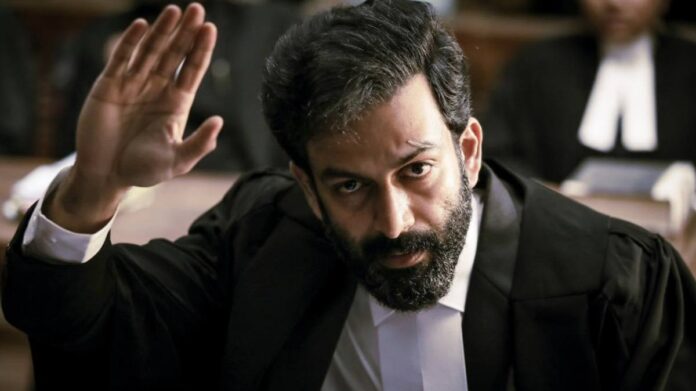Dijo Joseph Antony is largely known to the crowd for his almost average debut with “Queen” in 2018. This time around, Dijo showed more maturity in his political thriller “Jana Gana Mana,” released on Netflix. Featuring big names in the industry, this movie tried hard to balance between a thriller and a social message. The approach was right all along, but perhaps there are some points where the process went wrong.
“Jana Gana Mana” builds a premise with characters in a central university. The charred body of one of the most loved professors at the university was discovered by the police. The students started protesting for the sake of justice. They were brutally tortured by the police in this process. Then the Home Minister appointed ACP Sajjan Kumar (played by Suraj Venjaramoodu) to control the situation. He promised the victim’s (Professor Saba Mariam’s) mother that justice would be served.
Soon after this, four of the culprits were captured by him, and as it turned out, they were all killed in a planned encounter by Sajjan Kumar himself. The media responded in favor of the bravery the police officer had shown as the culprits were speculated to be released without any punishment from the court. They were killed before they were taken to court.
Human Rights organization files a case against ACP Sajjan Kumar and blames him for murdering the four accused, and from their side, Arvind Swaminathan (played by Prithviraj Sukumaran) turns up as a defense lawyer. He gathered some significant evidence that made the alleged rape of Saba Mariam into a hit and run case which eventually led to the acquittal of the four accused. As the plot progressed, it was proved to him that the whole plan was constructed by the ACP himself, except for the encounter, which was a direct order from the Home Minister.
There are basically two pillars to this political thriller. Both of the incidents produced two different victims. There was this one victim named Vidya in the university who was facing the everyday challenges of being born in a low caste, and then there was a Home Minister who was about to lose his chances of becoming the Chief Minister. So, out of these two, one victim came from power and the other was denied every chance in her life. Now, one incident helped these two collide with each other, and one took advantage of the other.
Vidya commits suicide, which seemingly is a forced death, and Saba Mariam asks the question, “Why?”. Saba Mariam was a free thinker, one of the reasons why she had so many students who admired her, but was killed for asking too many questions. At that exact moment, the Home Minister turned the accident into a rape case. The power game started to play on its own until the media and the people came to believe that justice was served.
In contemporary times the media has taken the mantle to pass a judgement and decide who is wrong and who is right. Yes, it is true that justice is a dilemma that haunts the victim’s worst nightmare. But at the same time, believing someone as a culprit without knowing whether there is any evidence to prove it or not, is a wrong thing indeed. In politics, the media plays a crucial part. It basically influences our decision.
Vidya is a magnificently bright student who was denied her Ph.D. again and again because of her caste. Casteism is a vice that still lives and breathes in contemporary times. There is a time when Arvind Swaminathan questions the witnesses in court, which sends a shiver down your spine. He talked about generalizing criminals and victims by saying UP, Bihar, and Kerala, but we missed out on pointing out all these as happenings in India.
There is another nice vantage point to the plot regarding rape and social media. According to the reports shown in the movie, there is a rape every 15 minutes in India. Do we always put hashtags on our social profiles? Do we always get shocked? No! Because society somehow normalized rape. We really do not really care about the victim. Even if we do, we tend to forget and move on with our own lives. The dialogue quite surprisingly brings out the hypocrisy behind our empathy toward a rape victim.
This film has many real-life influences, such as the 2019 gang rape in Hyderabad. We definitely have the tendency to judge people merely by their looks. The practice has been carried out in cinema too. In films, criminals always wear black clothes, or they have a darker skin tone, whereas the protagonist is fair and handsome. This discrimination is also founded in textbooks. Discrimination is something that is taught and nurtured with or without our knowledge. This is one of the most problematic aspects of our society.
In many ways, Dijo Joseph, through his film, “Jana Gana Mana,” has given the opportunity for the audience to understand the root of the problem. Similarly, in “Jay Bhim,” director T.J. Ghanavel tried to get to the core of the problem. The film does contain certain loopholes in the story, but the main message is pretty obvious and prominent. There are films that fail in many technical areas but deliver the message in a promising way.
You can see “Jana Gana Mana” on Netflix. It is a 2 hour and 39 minute thriller. Maintaining the subtlety for this period is quite promising in itself. Starring Prithviraj Sukumaran, Suraj Venjaramoodu, and Mamta Mohandas, this film can question your ideologies. It is quite astonishing how Dijo Joseph put together so many aspects, maybe one of the reasons why the screenplay seemed a little far-fetched at some points. But, all in all, it was a good show and definitely worth a watch. It was a tactfully made thriller with a rather thoughtful message.

